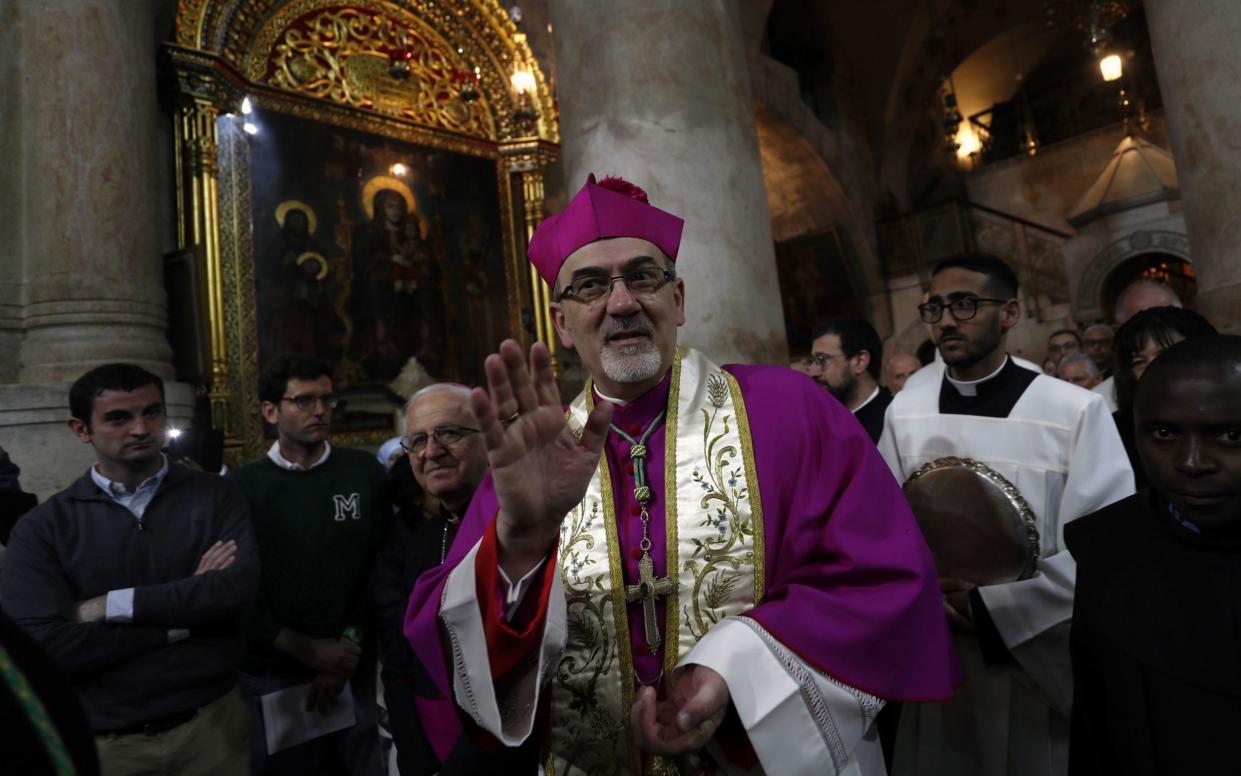Jerusalem’s Christians brace for attacks by Israeli extremists as they prepare to celebrate Easter

“This is a painful topic,” says Archbishop Pierbattista Pizzaballa as he sits in his office on a cloudy spring day in the Latin Patriarchate of Jerusalem. “Very painful.”
The archbishop was reflecting on a surge in hate crimes against Christians in Jerusalem in the run-up to Easter, which has prompted church leaders to hire private security and set up cameras around places of worship in the holy city.
“The aggression against Christians, Christian holy places and symbols is not absolutely new. But the frequency and violence, this violence is something quite new,” he told The Telegraph.
“For example, we have to put cameras on all the corners,” he added. “So our holy places, if you enter the field now, you can see that there is an iron gate. And I will say this is not part of the Franciscan spirituality. Because the Franciscan spirituality is the spirituality of a welcoming.”
While attacks against Palestinian Christians have been a concern for years, churches say they have experienced a notable increase in incidents in 2023 as Jerusalem boils under a wider escalation in the Israeli-Palestinian conflict.
The attacks have been both violent and symbolic. The new year began with the vandalism and desecration of 30 Commonwealth and Christian graves at the Anglican cemetery on Mt Zion, a crime that shocked Christians worldwide and was condemned by the Archbishop of Canterbury, Justin Welby.
Just three weeks before Easter, on March 19, two priests and a bishop were assaulted with an iron rod by two extremist Israelis in the Church of Gethsemane.
Concern for young seminarians
Church leadership and interfaith volunteers told The Telegraph that the attacks are almost exclusively against local Palestinian Christians, rather than pilgrims or tourists, and perpetrated by Israeli extremists.
Two Israelis have been arrested over the vandalism at the Anglican cemetery and it is understood that they are due to appear in court later this year.
Doron Turgeman. Jerusalem's Police District Superintendent, has insisted that the police are doing all they can to crack down on anti-Christian violence.
“As the police of all residents and visitors to Jerusalem, Jews, Muslims and Christians, we act against violence and acts of vandalism, and in particular those that hurt religious sentiments,” he said.
While some attacks this year have gained global attention, many smaller incidents happen constantly and go unnoticed. One Armenian priest told The Telegraph that he is often spat on three to five times during his daily walks from the Armenian Convent in the Old City to the Church of the Holy Sepulchre, the site where Jesus was believed to have been buried.
He says he is increasingly concerned about his young seminarians and worshippers, who are easily identifiable by their crosses.
The situation has become so violent that the Armenian Orthodox church now coordinates with a group of Israeli volunteers, called the Window to Mount Zion, who accompany the worshippers and clergy throughout the Old City, wearing yellow safety vests.
‘We take a picture because the police are not going to’
Yiska Herni, an Israeli teacher and volunteer at Windows to Mount Zion, says she has documented several hate crimes against Christians during processions, such as spitting, assaults and verbal abuse.
On Holy Thursday, she and a group of five volunteers accompanied a procession of Christians from the Room of the Last Supper to Jaffa Gate in the Old City.
“The goal is not only to be there, and to show solidarity, it is also to take pictures. If we see something taking place, then we take a picture because the police are not going to,” she said.
The churches have liaised with Israeli authorities, international diplomats, and Jewish leaders on the topic throughout the year. They are particularly concerned that the crimes are not being properly investigated and the perpetrators of these incidents are being let go.
However, some church leaders say that many Jerusalem rabbis have reached out to ask how their communities might help stem the violence.
Father Francesco Patton, of the Order of Franciscan Monks, said the new measures such as private security and cameras, were saddening but necessary.
“We have to employ somebody who checks the entrance and so on,” he said. “And for me, the idea is that this place should be open to everyone. But I understand very well that I am a dreamer.”

